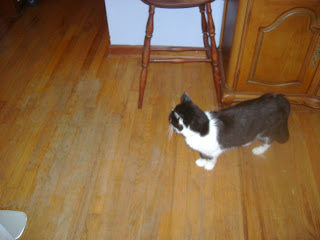On last Sunday morning, when all the music we hear seems to be from new age gospel, it might not be a bad thing to think of Death and Resurrection - in this case, Strauss's Death and Transfiguration - in more personal terms. Death and dying are something we face from birth on. It becomes part of our lives, be it a pet, a bird in the garden, a friend or a family member. It is a constant.
I was out in our garden area and near the resting place of our last departed cat. We have a conversation whenever possible and Saturday was no different although similarly one-sided as in his life. He talked; I listened.
I think he was saying that as happy and as loved as he was when alive, he is in an equally good place if not fantastically better. Emphasis on "fantastic". We want that for him as we do every living creature, humans included. We discuss sometimes that only humans are ones who plan and execute
 |
| Strauss the composer and seer of Death and Transfiguration |
I know that when I pass on I want the rest of it to be chock full of people shed of bad things, of pets loved and gone, family who I want to catch up with for an eternity and friends who I miss and long for. That is what I take away from Sunday morning conversations with my cat. That it will happen. In the silence. In the twinkling of an eye. At the last trumpet.
Strauss: Death and Transfiguration
- Largo (The sick man, near death)
- Allegro molto agitato (The battle between life and death offers no respite to the man)
- Meno mosso (The dying man's life passes before him)
- Moderato (The sought-after transfiguration)

Comments
Post a Comment